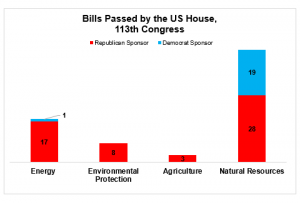2014 Election and the Future of Energy Legislation
Election Day is officially behind us. The votes are in, the campaign ads are over, and the traffic in front of the grocery store, local high schools and other polling places should go back to normal. The Republicans kept the House and took the Senate. Now the big question is: what does it all mean?
The Republicans taking the Senate could signal big changes in U.S. energy policy. This past session, Republicans and Democrats battled over the expansion of domestic energy production, GMOs and EPA regulations.
With majorities in both the House and the Senate, Republicans now have an opportunity to make some big changes in the environment and energy conversations. Yet as pointed out over at the NCPA Health Blog, running straight for the controversial topics will only lead to partisan bickering, not effective change. Rather than targeting the extreme topics, Republicans would do well to target their legislation at topics with broad, bipartisan support.
Over the course of the 113th Congress, 76 bills made it past the House, but have yet to make it past the Senate. For those that don’t make it through this session, the topics that already a) have enough clout to make it through the House and b) have enough bipartisan support to get through both houses without a huge expenditure of political capital.
Looking back at these bills, there are a few topics that stand out in both of these terms. Among them are:
Cutting Burdensome Regulations. Two bills, H.R. 2279, or the “Reducing Excessive Deadline Obligations Act of 2013” and H.R. 935, the “Reducing Regulatory Burdens Act of 2014,” both focused on cutting unnecessary regulations instituted under the banner of environmental protection. Curbing the growth of government regulations is rarely a bad idea, especially if you can do it in a bipartisan way. H.R. 935 passed with 62 percent of the vote, 8.6 percent of which came from the Democrats. While not a wide margin, it’s definitely a topic to consider as Republicans move forward into the next session.
Promoting Efficiency. No one likes inefficiency — not even Congress. H.R. 2126, the “Energy Efficiency Improvement Act of 2014,” passed the House with a whopping 87 percent of the vote. Energy efficiency, as well as procedural efficiency, could be a good focus for energy enthusiasts as we head into next session.
Increasing Domestic Energy Production. Increasing domestic energy production has the power to create jobs, boost the economy and protect national security. While definitely a more polarizing topic — the average number of Democratic supporters ranges from 7-20 for many of the bills that made it through the House, it could be a good strategy for a nation looking for an answer to Putin’s misbehavior. H.R. 6, the “Domestic Prosperity and Global Freedom Act,” actually passed with 62 percent of the vote. Exporting our natural gas reserves could be a huge help to the parts of Europe dependent on Russia, and the jobs and money it would bring in here at home aren’t a bad tradeoff.
As this next session gets under way, Republicans should keep in mind the lessons learned from Obamacare: Focusing all of your political capital on a partisan agenda right at the beginning can be disastrous. Focusing on smaller, bipartisan measures can have just as big an impact and hopefully with less of a mess.

Agreed. I think the republicans would be wise to build momentum, rather than forcing major change too quickly.
I completely agree. In this respect, foreign policy and energy policy present the opportunity to kill two birds with one stone, the US has the opportunity to saturate the European markets with LNG and dilute the market-power Russia and China have weaponized. If I were a Republican in Congress, tackling this issue would be my first step towards creating bipartisan leadership.